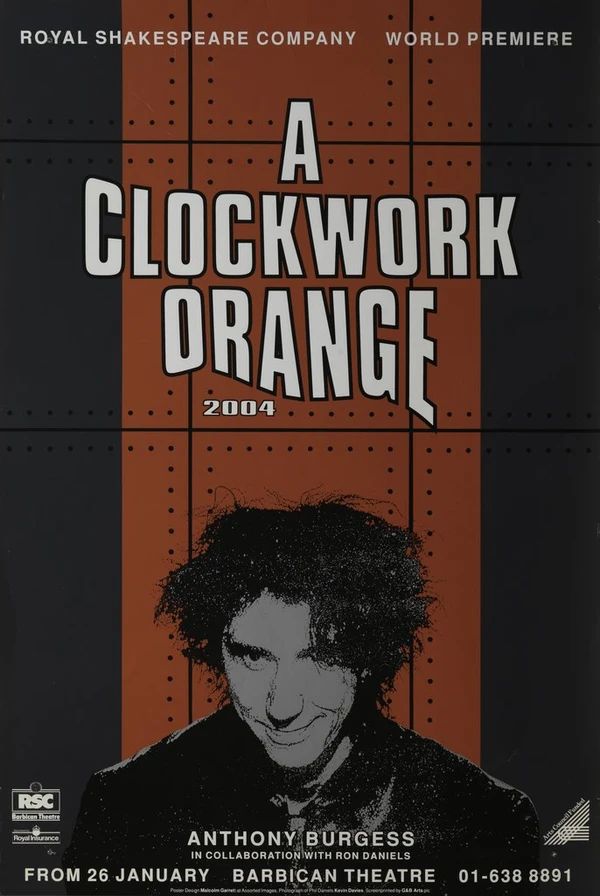A Clockwork Orange 2004
Given the publicity accorded to both the film of Anthony Burgess’ and the novel itself, it is not surprising that the Royal Shakespeare Company’s “official version” broke box-office records, even before the official opening. Starring Phil Daniels of “Quadrophenia” fame, with music by Bono and The Edge from U2 and choreograpghy by Arlene Phillips, it was clearly going to be an interesting experience, especially for someone like myself with little experience of live theatre, though I am familiar with both the book and Kubrick’s well-known/notorious movie.
There were some marked differences between the play, the book and the film. In the book, Alex rapes a pair of ten-year old girls; this was too much to take (even for the director of ‘Lolita’!) and was toned down to consenting sex with a pair of teenagers. The play misses it out altogether, with little detriment to storyline or atmosphere. On the other hand, the stage show reinstates a contrasting passage with Alex being raped while in jail and killing his attacker, which Kubrick excised.
The most severe change is at the end. Burgess’ American publishers disiked the ending, which has Alex contemplating marriage & settling down, so they cut it out, leaving the readers with the impression that Alex at the end was just the same as Alex at the beginning. This was the version Kubrick saw and filmed, changing the entire tone of the film. The RSC included the epilogue, restoring Burgess’ original meaning. Despite the wide gulf between the two, I regard both endings as justifiable and appropriate, and don’t feel that one is significantly better than the other.
To the production itself. The theatre is obviously a different medium from the film where the spectator is restricted to one viewpoint and everything has to be ‘larger than life’ to be comprehensible to the plebs in the cheap seats. The core of the first half is the violence; if perhaps it was occasionally like watching a disturbance at the away end of a football ground, this was more than made for by the impact when the timing of the action, the sound and the reaction all meshed perfectly. Then, it was astonishingly easy to suspend the disbelief, since you knew there were no clever camera angles or latex models – your own eyes gave you all the ‘evidence’ you needed.

The sets were sparse, but effective. The Korova Milk Bar, one of the key locations, had little more than a giant milk bottle suspended over the stage, while the back- drop, consisting of huge slabs of ‘metal’ rivetted together, was just as believable as F. Alexander’s house, the prison or a piece of waste-ground. The costumes were impressive, ranging from the bowler hats and waist-coats of Nadsat fashion to the police uniforms.
The only annoying thing about the production (save the hideous amount of coughing which went on, though apparently it was LESS than average!) was the music, which added nothing at all, and was sometimes a pain in the neck. This included an almost unrecognisable version of Heane 17’s “We Don’t Need This Fascist Groove Thang” (who took their name from a group in the novel) and on the whole, I’d have been far happier with just the odd snatch of Ludwig’s Ninth.
A performance like this stands or falls on the actors, however, and Phil Daniels delivers the goods. It might have been more effective to have had a younger actor ( Alex’s age ranges from 15 to 18 during the play, Phil Daniels is nowhere near this range) since it is a play about youth and a lot of the tension derives from this, but Daniels is now so accomplished at playing ‘villains’ that it’s second nature to him, much as Anthony Perkins is a plausible psychopath. He delivers the Nadsat slang, a mix of Russian & English (which sounds more plausible now than when the book was written) with fluency and verve, bringing it to life.
The other actors are overshadowed by him, yet perform competently. The only exceptions are Russell Enoch as F. Alexander, who overacts badly and Nathalie Roles, whose performance as the little old lady murdered by Alex could have come straight out of a Herschell Gordon Lewis film. That whole scene, complete with stuffed cats flying about the stage propelled by Alex’s boot (and pre-recorded meowing as well), was about the only one where the play was notably deficient.
Overall, it’s difficult to find fault with the play, but whenever I think of a scene it’s still seems to be the film that springs most readily to mind.
